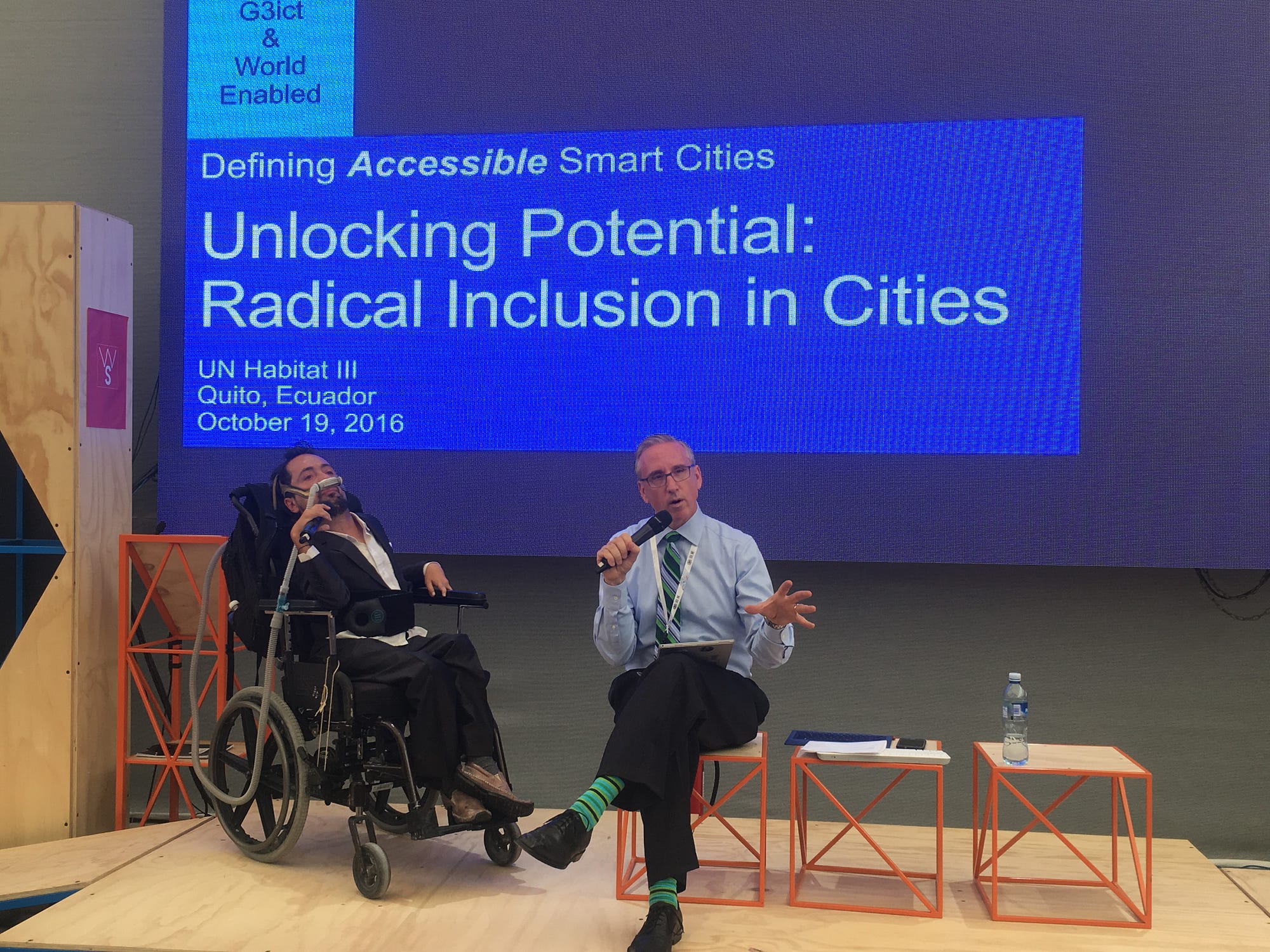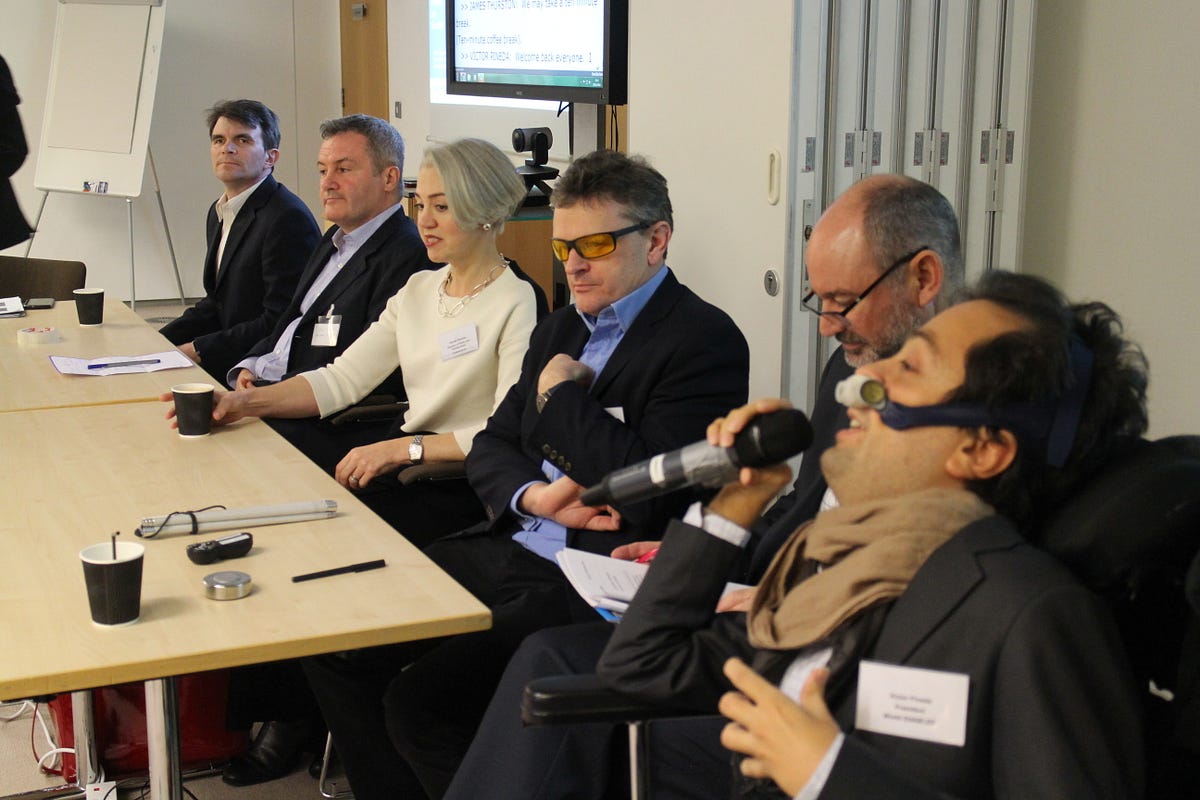Smart Cities For All Paves The Way To Digital Accessibility In Cities

City leaders, IT managers, and entrepreneurs that embrace Smart City solutions care about ICT, not for its own sake, but instead for the ways these solutions can help governments, communities, and enterprises achieve better results.
That was the message I kept hearing during a series of roundtables I facilitated with my colleague James Thurston of G3ict. Whatever these specific objectives of a city may be, it was clear that they would fall short if they systematically fail to include large segments of a city’s populace.
There is now ample evidence to suggest that “Smart Cities” are leaving out a very large minority population found in every city in the world, namely persons with disabilities. According to research conducted by the World Bank and the World Health Organization, persons with disabilities (PWDs) represent 15% of the world’s population. A recent global survey conducted by World Enabled and G3ict shows that a majority of the 250 global smart city leaders surveyed believe that today’s Smart City initiatives are leaving out persons with disabilities. How can smart cities be smart if they potentially exclude out one in seven people?
To illustrate the magnitude of the problem, just 18% of the surveyed experts are even aware of Smart Cities that use ICT standards that ensure accessibility for users with disabilities. The failure, up to this point, to regularly incorporate accessible ICT into Smart Cities initiatives certainly presents hazards to effective city management. Forward-thinking urban planners in Quito however, are working to bridge the digital divide for persons with disabilities by efficiently allocating resources to reap the benefits of ICT accessibility. It was apparent that more could be done to generate awareness of the technical and economic advantages of ICT accessibility.

World Enabled and G3ict joined forces to develop a the Smart Cities for All initiative and help government, business, community, and technology leaders make the case to their peers and constituents for incorporation of ICT accessibility into their Smart City programs. Some preliminary findings will be shared during our high-level panel on the opening day of the New York City Smart City Expo being organized at the beautiful Brooklyn Navy Yard on May 3rd. The panel will discuss:
- global trends in urbanization, the demographics of disability and aging, and the benefits of ICT technologies
- the role of accessible ICT in creating untapped opportunities for business profitability and local economic growth
- the importance of ICT accessibility in ensuring compliance with national and international legal norms, promoting human rights, and meeting the kinds of policy objectives that Smart Cities initiatives are designed to promote
- the advantages of incorporating ICT accessibility in the development and implementation of technologies that reduce ICT costs and better serve the needs of all (including people without disabilities)
City leaders advocating for accessible ICT have mentioned to us that they sometimes need to use both a carrot and a stick (positive and negative) arguments to best make their case. Municipal lawyers might, for example, be worried about easily avoidable legal liability created by inaccessible ICT. While mistakes can happen, a municipal bus service’s financial losses resulting from a faulty wheelchair tie down could have been completely avoided if ICT would have allowed the strap to automatically report the defect or at least allow a passenger to painlessly notify the service of the defect with a fully accessible app. A city tourism official might, on the other hand, be best moved by the unlocked potential of ICT in helping make the city a destination for the large market of travelers with disabilities.
As cities explore the potential of networked sensors, big data, artificial intelligence, natural language, computer vision, cloud computing and augmented reality, they have an unprecedented opportunity to ensure their citizens have an equal opportunity of benefiting from their cities digital services.

The Smart Cities for All team worked with the Global Network for Disability Inclusive and Accessible Urban Development (DIAUD) to ensure that ICT accessibility was included in the negotiations leading to Habitat III. As a result ICT accessibility is now explicitly mentioned in the New Urban Agenda.
The future of our cities is in our hands, on our phones, and in the cloud. Over the past 10 months, we have actively engaged with diverse stakeholders including persons with disabilities, IT professionals, city leaders in cities like New York, London, Barcelona, San Francisco and Quito. These cities have demonstrated a commitment to ICT accessibility and by doing so are paving the way towards a more equitable and inclusive urban future. We hope that the Smart Cities For All initiative contributes to redressing the digital divide for persons with disabilities and older persons in Smart Cities programs worldwide.
About G3ict
The Global Initiative for Inclusive Information and Communication Technologies — is an advocacy initiative launched in December 2006 by the United Nations Global Alliance for ICT and Development, in cooperation with the Secretariat for the Convention on the Rights of Persons with Disabilities at UN DESA. Its mission is to facilitate and support the implementation of the dispositions of the Convention on the Rights of Persons with Disabilities (CRPD) promoting digital accessibility and Assistive Technologies. More information can be found at http://g3ict.org/
About World Enabled
World Enabled is a global education, communications, and strategic consulting group. We support companies and governments with the full implementation of legal mandates that promote the rights of persons with disabilities. Our work and research initiatives focus on urban planning and inclusive urban development. With our international partners, we build inclusive societies where people with disabilities fully develop their talents and reach their full potential. More information can found at http://worldenabled.org/
Additional Smart Cities for All Resources
Our resources becomes available for download free of charge on May 3rd, 2017 at www.smartcities4all.org
Contact: info@smartcities4all.org
Content retrieved from: https://medium.com/smart-cities-for-all/smart-cities-for-all-toolkit-paves-the-way-to-digital-accessibility-in-cities-da93fe6f8cda.
Upcoming Events
There are no upcoming events.




